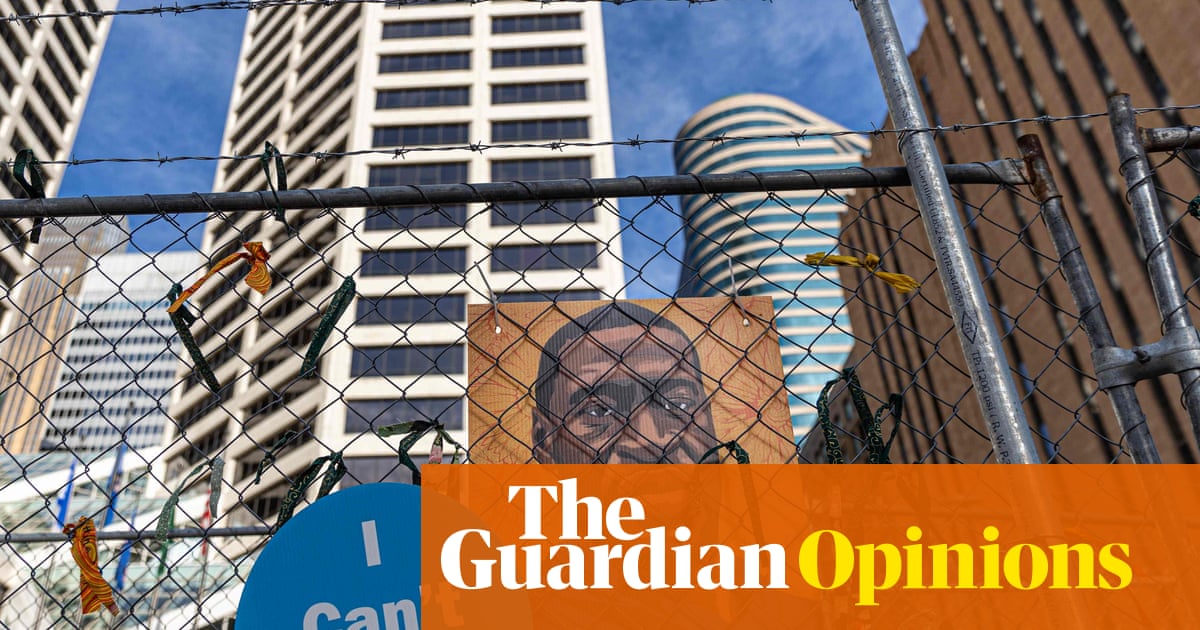Yesterday, I led a private memorial service at George Floyd’s graveside, along with his family, in Houston, Texas. Once that was over, we visited the housing project where Floyd and his siblings grew up.
Half a decade after Floydwas taken from them, they were keen, as are we, to ensure his life and legacy will not be forgotten – and to remind the world why the fight for police accountability continues.
He died in front of the entire world. Everyone saw the phone footage of the incident where a white officer in Minneapolis kneeled on Floyd’s neck for more than nine minutes as he repeatedly said “I can’t breathe”, and cried out for his mother. His desperate pleas for help were ignored by those sworn to serve and protect the public; but they were heard in every corner of the globe.
The movement for police reform gained renewed fire, and people from all walks of life demanded systemic change and the protection of Black lives. Five years later, while the officer convicted of Floyd’s murderis behind bars, the current climate in the US and regressive actions from those in power have set us back and prevented substantive police accountability.
Just a few days shy of this sombre fifth anniversary, Donald Trump’s department of justice announced thatit would back awayfrom cases to force reforms on police departments – including in Louisville, Kentucky, and in Minneapolis, the city where Floyd was killed. This outrageous decision is not a surprise; it is just the latest roadblock in the fight for police reform and justice. It is an insult to the mothers, fathers, children and loved ones of all those killed at the hands of law enforcement. The consent decrees and small incremental changes that were achieved after tireless advocacy, organising, protests and political courage have been dismantled by a department that should be protecting the civil rights of individuals, not eliminating them.
This move isn’t just a policy reversal. It’s a moral retreat that sends a chilling message that accountability is optional when it comes to Black and Brown victims. Trump is shamelessly weaponising the justice department against marginalised communities. The decision to dismiss these lawsuits with prejudice solidifies a dangerous political precedent that police departments are above scrutiny. The timing is no coincidence; it is an insult to Floyd’s family and the loved ones of victims such asSandra Bland,Tyre Nichols,Breonna Taylor,Eric Garnerand countless others whose names we may never even know.
I remember delivering the eulogies for Floyd (one in Minneapolis and one in his native Houston) like it was yesterday. There was so much frustration, anger, disgust and exhaustion permeating throughout the US and, in turn, in many nations across the world. In fact, his death sparked global protests against racial injustice, particularly at the hands of law enforcement. Many young people mobilised and hit the streets for the first time, and more than 200,000 folks joined us in the nation’s capital for amarch on Washingtonin August 2020 to call attention to ongoing police injustice. Despite a pandemic, hundreds of thousands from all races, ages and socioeconomic backgrounds protested alongside my organisation,National Action Network(NAN), as we led this march through the streets of Washington.
Much has changed. In the wake of Floyd’s killing, and amid calls to respect Black lives, many corporations made commitments to continue diversifying and investing in our communities. Now we are watching many of those same companiesturn their backson their own diversity, equity and inclusion policies, capitulating to a rightwing government. The 2021 conviction of Derek Chauvin, the officer who killed Floyd, represented one of the first major cases in which someone in law enforcement was held accountable for their actions. But now some conservative groupsand individualsare pushing for Chauvin to receive a pardon from the president. Such action would be the height of throwing salt into an already achingly deep wound. It should not be entertained for a moment.
Some (particularly those in power at the moment) would like to distort reality and act as though police brutality and misconduct aren’t current problems. Nothing could be further from the truth. According toMapping Police Violence, police in the US have killed 456 people so far this year (as of 23 May). In fact, there has only beena single daywhen police haven’t killed a person in 2025. And as it highlights, Black people are 2.8 times more likely to be killed by law enforcement than their white counterparts. This is why we still march, this is why we still put pressure on elected officials and corporations.
For several months, NAN and I have been leading “buy-cotts” to support businesses such as Costco who remain firm in their DEI commitments. I have had meetings with PepsiCo’s chair and the CEO of PepsiCo North America, as well as Target’s CEO. Recently, I joined fellow leaders of national civil rights organisations for a meeting with top Google executives. And on 28 August, NAN will lead a march on Wall Street to defend DEI, remind corporations of their own promises in the wake of Floyd’s death, and reiterate that we will only spend our dollars where we are respected.
When I stood in front of mourners five years ago at Floyd’s funeral, I said that his story has been the story of Black people, because the reason we could never be who we wanted and dreamed of being is because society kept its knee on our neck. Well, just as we loudly proclaimed around the world then, we say it again, remembering George Floyd, remembering all the victims: get your knee off our necks. Do it now.
Rev Al Sharpton is an American Baptist minister, civil rights activist and radio talkshow host
